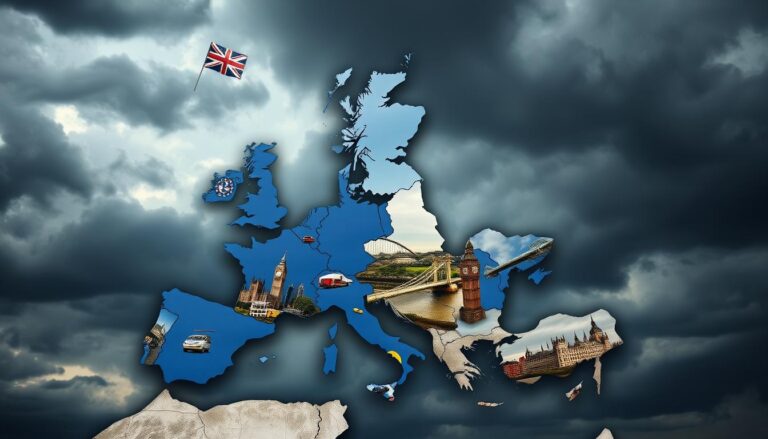It has been over half a decade since the United Kingdom made the monumental decision to exit the European Union, a phenomenon known to all as Brexit. This landmark event has drastically reshaped the political and economic landscape, not only for the UK and Europe but also for the wider global community. For many, it stands as a defining moment in recent European history—an echo reverberating across borders and continents, resonating with policymakers, businesses, and everyday people.
The Brexit referendum that took place in June 2016 signalled a tipping point; 51.9% of participants voted in favour of leaving the EU, while 48.1% wished to remain. With a voter turnout of 72.2%, the choice to sever ties was clear but contested. The political landscape saw stark contrasts—with 53.4% of English voters backing Brexit, in sharp contrast to the mere 38% in Scotland. This divergence heralded intense discussions about the UK’s future and its role on the world stage.
The Brexit timeline is fraught with pivotal moments that encapsulate the complexities of detaching a nation from a deeply integrated union. From the initial referendum to the subsequent Parliamentary withdrawal agreement vote, where 432 members rejected the deal against 202 who favoured it, Brexit was everything but straightforward. Yet, the decisive victory of Boris Johnson’s Conservative Party in the December 12 election with 365 seats out of 650 solidified a path forward, albeit one still fraught with uncertainty and debate.
Brexit’s impact on the UK is undeniable. The withdrawal from the EU’s single market saw an approximate 25% decrease in UK imports from the EU in 2021 compared to other global imports. The UK’s trade openness as a proportion of GDP dropped by 8 percentage points between 2019 and 2021. Increased trade costs and paperwork burden British businesses, with customs export declarations more than tripling, and import declarations rising by 50%. Consequently, post-Brexit business investment in the UK fell by over 30% below the pre-referendum trend. Meanwhile, investment in the EU surpassed pre-2016 levels.
For the EU, Brexit has equally significant reverberations. Germany, the primary Eurozone country, is reconsidering its approach to debt pooling and fiscal policies within the bloc. The UK’s departure has prompted questions about the EU’s unity and long-term economic strategies. Eurozone fiscal rigidity during the economic crisis and the subsequent lacklustre growth further highlight the challenges faced by the remaining member states without the UK.
Globally, Brexit demonstrates the importance of international cooperation and the fragility of integrated economies. Trade relationships, diplomatic ties, and geopolitical strategies must adapt. The UK’s quest for post-Brexit trade deals underscores these shifting dynamics. However, with agreements in place covering only 61% of UK trade, as opposed to the pre-Brexit 64%, and missing the 2022 target of 80%, there is much yet to be resolved.
In essence, Brexit is a multifaceted phenomenon with lingering consequences still unfolding. As the UK redefines its place on the global stage, it is a time of reflection and recalibration for both the nation and its European neighbours. The Brexit timeline is a vivid illustration of modern democracy’s complexities and the enduring impact of collective choices on regional and global scales.
What is Brexit?
Brexit, a portmanteau of “British exit,” signifies the United Kingdom’s departure from the European Union. This monumental decision, stemming from a referendum, has ushered in a new era marked by significant political, economic, and social transformations. Here, we delve into the origins, crucial events, and the referendum that defined Brexit.
Definition and Origins
To understand What is Brexit?, one must first trace its roots. The term Brexit combines “Britain” and “exit,” reflecting the UK’s move to sever ties with the EU. The origins of this movement are deeply entwined with debates over sovereignty, immigration, and economic independence. Prior to Brexit, the UK had been a member of the EU since 1973, navigating through several treaties and policies that often ignited heated national discourse.
The 2016 Referendum
The turning point for Brexit occurred on 23 June 2016, when the UK held a referendum to decide its future within the EU. The question was simple: “Should the United Kingdom remain a member of the European Union or leave the European Union?” The result was a narrow victory for the Leave campaign, with 51.9% voting in favour. This decision set off a chain of events including intense Brexit negotiations and complex political manoeuvres, ultimately redefining the political effects of Brexit.
Timeline and Key Events
Brexit’s journey is punctuated by significant milestones:
- 29 March 2017: Then-Prime Minister Theresa May triggered Article 50, starting the formal exit process.
- 14 November 2018: The first Withdrawal Agreement was negotiated but faced significant domestic opposition.
- 17 October 2019: A revised Withdrawal Agreement was concluded, addressing key concerns.
- 24 January 2020: The Withdrawal Agreement was officially signed, and the UK formally left the EU at 11 p.m. GMT on 31 January 2020.
- The Transition Period, designed to provide continuity, lasted until 31 December 2020.
- 31 December 2020: The Trade and Cooperation Agreement (TCA) came into effect, governing post-Brexit relations.
The future of the UK post-Brexit rests upon the Trade and Cooperation Agreement, which comprises four main sections: free trade, economic and social cooperation, internal security, and governance framework. Notably, this agreement centres on Brexit trade agreements predominantly concerning goods, with further discussions required for services.
| Key Event | Date | Description |
|---|---|---|
| 2016 Referendum | 23 June 2016 | 51.9% voted for Brexit |
| Article 50 Triggered | 29 March 2017 | Formal Brexit process began |
| First Withdrawal Agreement | 14 November 2018 | Initial agreement faced opposition |
| Revised Withdrawal Agreement | 17 October 2019 | Addressed key issues for the UK |
| Official Brexit | 31 January 2020 | UK formally left the EU at 11 p.m. GMT |
| Transition Period End | 31 December 2020 | Trade and Cooperation Agreement implemented |
Causes and Consequences of Brexit
The causes of Brexit are deeply rooted in various socio-political and economic factors. One key driver was the long-standing Euroscepticism fuelled by decades of anti-EU sentiment in the UK media. Concerns over national sovereignty and the European Union’s migration policies played significant roles, influencing public opinion leading up to the 2016 referendum. Many citizens felt that EU policies were infringing upon the UK’s autonomy and economic stability, particularly in regions that perceived minimal benefits from EU membership.
Economically, the consequences of Brexit are both immediate and far-reaching. Data reveals that the price of food imported from the EU spiked by up to 6% during 2020 and 2021, impacting household budgets. On the flip side, domestic food producers experienced a £5bn boost. However, the UK’s trade with the rest of the world has declined relative to the size of the UK economy. The Office for Budget Responsibility projects that Brexit will leave the UK economy 4% worse off, with 71 post-Brexit trade deals mostly replicating previous EU agreements. Furthermore, there are now 330,000 fewer workers in the UK, exacerbating staff shortages across various sectors.
The global political shifts due to Brexit have also been significant. The EU and UK’s redefined roles have prompted other member states to re-evaluate their national policies towards sovereignty and border control. Sector-specific stakeholder preparedness notices and training sessions were vital during the Article 50 negotiations to mitigate disruptions. The Brexit Adjustment Reserve Regulation targeted the worst-affected sectors to counter adverse impacts, highlighting the extensive efforts required to handle the transition. The European Commission’s Communication on “Getting ready for changes” identified key affected areas, shaping policy reforms and guiding preparedness measures.
Moreover, the withdrawal’s broader implications include decreased efficiency in law enforcement cooperation, complications in travel arrangements, and potential long-term economic detriments. Scotland, for example, anticipates an annual loss of £3 billion in public revenues and faces significant obstacles across business and tourism sectors. As Brexit shapes future EU integrations and reforms, its full spectrum of consequences continues to unfold, underscoring the monumental impact of this historic decision.

